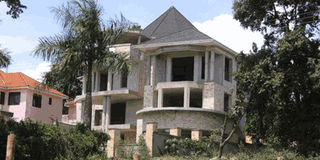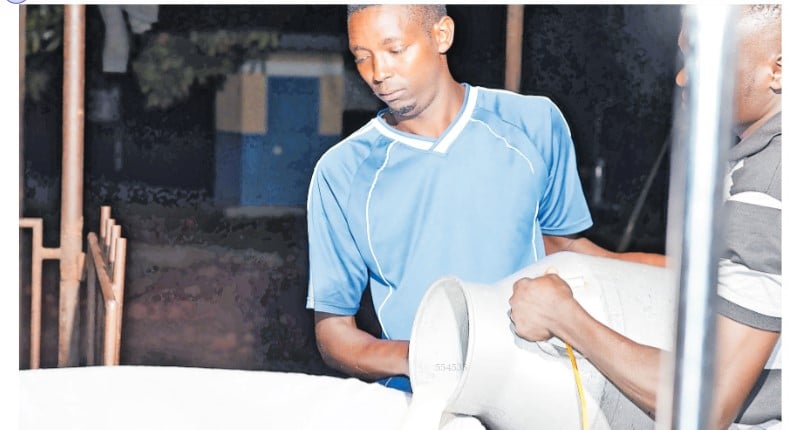Prime
Beware of land title fraudsters

Before you begin to construct your dream home, make sure that your land title is genuine, otherwise you may be thrown off land that you paid a lot of money for. Photo by Ismail Kezaala.
What you need to know:
Just a few minutes of reviewing your title is enough for a fraudster to get the details of the successive land transfers, use them to make a fake land title and then sell off your land.
Dr Timothy Lwababi went to the UK twenty years ago after buying a plot of land in Mukono at a giveaway price. He went with the land title. On coming back, he was surprised to find that the area had not only developed but that someone had constructed a school on his 10 acres of land.
“He even had a land title that was found genuine when cross-checked with the Lands Registry. I also had a land title for the same piece of land, just that his was more recent. Apparently I had sold the land to someone who then sold it to this man five years ago according to the transfer names indicated in the title,” Lwababi says.
People in the diaspora are common victims of double titles
Dennis Obbo, the spokesperson of Ministry of Lands, Housing and Urban Development explains that people living in the diaspora are the commonest victims of this kind of fraud.
“They will come claiming they are owners who lost a title when the owner is abroad,” Obbo says. “Before issuing it we will put up a 30-day notice in the Ugandan Gazette for anyone who disputes their ownership to contact our office.”
After 30 days, the fraudster will be issued with a duplicate land title that is as genuine as what you have abroad.
“The fraudster will present a fake ID with the correct names of the original owner (this was before passport photos were required five years ago). Today, he can pretend to have powers of the attorney to transact business on your behalf,” Obbo says adding that, “Once the land title is out, the fraudsters will go ahead and sell. They usually do a number of transactions/transfers before selling to someone who has no idea about this fraud.”
Some genuine owners decide the court process will be too costly and too lengthy, so they lose their property- just like that. Others go to court and it takes them even 10 years to get their land back. Others decide to come to an amicable understanding with the current owner to pay them something or help them trace the sellers by which time, the fraudsters have switched off their phones and disappeared.
At this point, both the original owner and final owner are victims and Obbo says that they usually refer them to court for arbitration.
“It is complicated and only court can pronounce itself on the issue.”
But this kind of fraud can happen right under your nose. It only takes a relative or someone close to steal your land title and copy the details in order to make a fake. Then the land is sold and a caveat is placed on it. By the time you think about developing the land or building your home, it will be battle with the other owners.
Obbo advises that whoever has land, to regularly check the Uganda Gazette to make certain that your land is not up for sale. For those abroad who would like to check the status of their land, a list of gazetted land titles dating as far back as April, 2009 has been put up on the Lands’ website-mlhud.org.
Even established property developers can act fraudulently
Obbo says he has also received a number of complaints against some of the established property developers in town who issue mass titles.
“When the person is buying, he is shown a plot and he likes it. Then when the title is brought, it indicates a different plot from the original location.
The plot will have a block number but because people are usually not keen, many of them will start developing the land. Florence Nantambi who bought in Gayaza was one such victim. She built and stayed in her home for a full two years. It is only when she went to get a loan from the bank using her home as collateral that the bank told her she had built on a different piece of land. She had to locate the owner of her plot and convince him to transfer his land into her names and vice versa to save her home.
Selling plots that are less than what you’re verbally told while inspecting is the other form of fraud. While most property developers will claim that their plots are the standard 50x100 ft. in actual sense the plots may be say, 50x 80 ft.
Obbo says that government is currently putting in place a legal framework o regulate property developers in order to protect such victims.
Titles for road reserves, environmentally fragile Land, forests and government land
Speaking on condition of anonymity, let’s call him Peter, bought land from an estate near the lake. The small plots nearest the lake were at a whooping Shs50m. For all the buyers, the bait was the area stretching from their plots to the lake that they could utilize. On the seller’s property website, this strip had been indicated as gazetted public recreational area.
“We all bought land near the water and we were told that it was a public recreational area and that we could all use it as long as we did not construct permanent structures. Infact, this area did not have land titles,” Peter says. “To our surprise, we were later told that we had the first priority to buy infront of plots or else, they had titles and were selling to other buyers. Legally we couldn’t complain because the offer we had been given to utilize this trip had been verbal. Imagine buying what you previously knew was yours at a much higher value than the plot. We had no option but to find the money because these. Those who could not afford lost out. Apparently, the marketing people had lied to make sales.”
Just last week, Sarah Kizito was in a fiasco with Nema and Kcca officials over a wetland in Bugoloobi that she wants to develop into a recreational centre. Daily Monitor of July 25th, 2012 reported KCCA’s director of physical planning Joseph Semambo had warned Kizito against establishing the recreational facilities in the wetland without clearance from KCCA and Nema.
In other cases, land is sold during the dry season when purchasers cannot tell that the land on offer is in a wetland. Case in point is Bwaise. There are many other such gazetted areas that may be sold out fraudulently.
Fraudulent acts like double titles and the existence of genuine land titles for gazetted land cannot occur without the help of officials inside the Lands’ Registry. Certainly, this office is in dire need of an overhaul.
Tips to beat the fraudsters
- Visit the land and physically inspect it. If abroad, find someone trustworthy to do it on your behalf.
- Talk to all the neighbours in the vicinity to confirm that that the purported seller is infact the rightful owner. If there are disputes, do not buy. Better safe than sorry.
- Meet the actual owner of the land and not merely his purported agents. Go with him to the Lands Registry to verify the land in question.
- Hire a registered advocate to act on your behalf in the land transaction as the acquisition of land is a technical legal process and you are dealing with people who have mastered the art of fraud in this area.
- Consult a reputable valuer or the government valuer to establish a fair market value for the land on offer. Beware of property offered for sale at throw away process and in a great hurry. It may not always be genuine.
- Insist on seeing the original land title and take it to the Lands’ Registry for verification before parting with your money.




